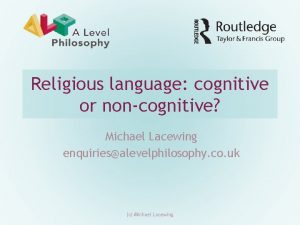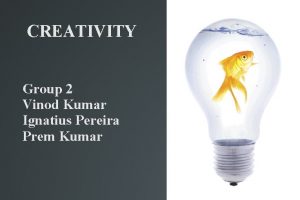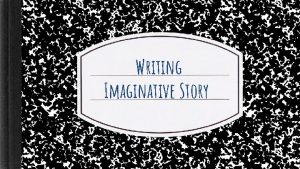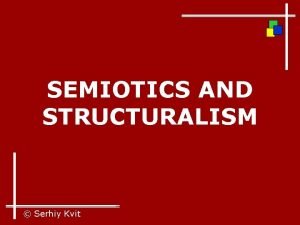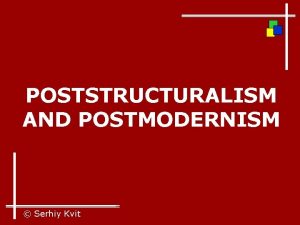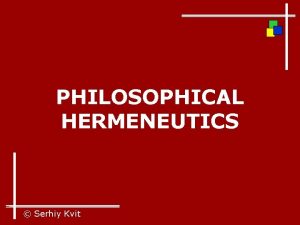Ignatius Loyola Cognitive and Imaginative Understanding Serhiy Kvit
















- Slides: 16

Ignatius Loyola: Cognitive and Imaginative Understanding © Serhiy Kvit

Ignatius Loyola (1491 – 1556) the spiritual exercises

Ignatius Loyola was the prototype of Don Quixote, who has tried to find an “internal person” of St. Augustine inside himself.

Ignatius Loyola Ø Started to learn Latin language in 33 years old for studying at Sorbonne University Ø Hermeneutics as an internal experience of culture Ø Public activity: Society of Jesus (Jesuits), established in Paris in 1539 Ø Kyiv-Mohyla Academy was established in 1615 on the model of the Jesuit Collegium

Ignatius Loyola "Spiritual Exercises" are divided into four weeks, during which a person experiences with Jesus his earthly life, including suffering, death, and resurrection. A person is gradually cleansed, enlightened, dying and reviving.

Ignatius Loyola Spiritual exercises and meditations help a person to learn to distinguish between good and evil, strengthen him or her in the Christian faith, and allow to see more and to understand deeper than a person can perceive different things and phenomena in the world of surface apparent evidence.

Ignatius Loyola Trying to distinguish between good and evil, a person also explores himself (herself). The intentions of a person are important. A person can move from good to better, or vice versa, from bad to worse. In the first case, the touch of the angel will be soft and tender, and the voice of the demon will sound loud and rough. In the second case, both of them will work in the opposite way. Therefore, according to Loyola, we have to expect both witnesses always and everywhere.

The Primary Text and the Secondary Text Antonio Nicholas speaks of philosophy as thinking, largely deprived of historical contextuality (besides terminology). He offers the concept of primary and secondary texts, where the first one is associated with the body, and the second one - with public signs. That is, on the basis of internal human technologies, we can say about the ordering of society and public life.

Cognitive and Imaginative Types of Understanding The secondary text is a sign system that is interpreted. It is itself used to interpret the original (primary) text. Nicolas offers two models of understanding: cognitive and imaginative. Cognitive skills allow us to read a semiotic text. The imagination gives us special signs to understand different emotions (including laughter and tears). This experience includes everything except the subject of thinking.

Imaginative Understanding with the help of imagination is aimed not at the perception of new information as such. They remind the reader of what "the memory forgot" about. In such way Loyola, when he was wounded in a war, read knight novels. Nicolas speaks of an oral / sound culture that organizes itself on the basis of acoustic criteria and uses them as a technology for listening and memorizing. This is the primary language about integrity, framework, harmony, context - and only then about concrete things.

language of Conviction and language of Imagination The language of conviction and language of the imagination complement each other, but they cannot be mixed. Cognitive thinking increases conviction, the language of imagination strengthens faith. In order to interpret the primary text, we have to understand the technology by which it was created. Otherwise, the philosopher always will pull out the rabbit of the hat, whom he previously put there.

New Articulation of Language The original text operates not a repetition of already acquired knowledge, but rather a new articulation of language, always present as a source, as well as through the creation of new images. The task of the primary text is to open the horizons already known and, however, newly articulated. The imagery are innovative, they update the human sensibility and do not tolerate doubts.

Human Stories Nicolas refers to human stories that fills the culture (stories of Odyssey, of Romeo and Juliet, of Jesus, of Loyola and Don Quixote, and the stories of all your favorite literary, historical or real heroes as well). In this case real stories also are becoming epical and historical.

The Role of Experience If you want to understand a certain phenomenon of culture, you must first feel and experience it.

Phenomenological Aspects In this approach there are phenomenological aspects (thinking by images as thinking by essences).

Followers of Loyola • St. Augustine, Hans Georg Gadamer (hermeneutic conversation): the good is that sounds good • Wilhelm Dilthey (romantic hermeneutics): mutual understanding through empathy • Edmund Husserl (phenomenology): thinking by the essences • Martin Heidegger (philosophical hermeneutics): essayistic over-interpretation • Michel Foucault (philosophical demanding to the philosopher): the care of the self
 Nmos inverter with depletion load
Nmos inverter with depletion load Cognitive and non cognitive religious language
Cognitive and non cognitive religious language Ignatius heruwasto
Ignatius heruwasto Defination of a contract
Defination of a contract Ignatius adrian mastan
Ignatius adrian mastan Ignatius v bell
Ignatius v bell Sini ignatius
Sini ignatius Ignatius adrian mastan
Ignatius adrian mastan Ignatius pereira journalist
Ignatius pereira journalist 444 ptt
444 ptt Ignatius old testament study bible
Ignatius old testament study bible Idealife.rerc
Idealife.rerc Paper 1 fiction and imaginative writing
Paper 1 fiction and imaginative writing Example of imagination story
Example of imagination story Jolliffe diagram
Jolliffe diagram Literary elements of literature
Literary elements of literature Diary entry format
Diary entry format

